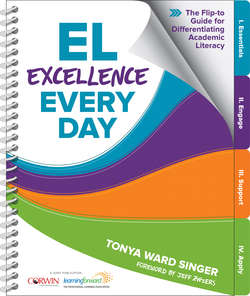Читать книгу EL Excellence Every Day - Tonya Ward Singer - Страница 18
На сайте Литреса книга снята с продажи.
What About My Students Who Aren’t ELs?
ОглавлениеThis is a great question most core teachers ask when we talk about EL instruction. It’s important because most core classrooms include both ELs and non-ELs.
A common assumption is that to use EL-specific strategies we need to work with ELs in a separate group and get the rest of the students to do something on their own. That’s one approach but not the one I emphasize here. In this book, I emphasize teaching the entire class to the high-level expectations of your content and literacy standards and then personalizing instruction based on the unique strengths and needs you identify as students engage in your lessons.
It is not productive to assume that one strategy must be used for all ELs and not for other students. Collaborative conversations, for example, benefit everyone every day. Linguistic scaffolds, such as linguistic frames (aka sentence frames), can benefit some ELs and hinder others. It all depends on the task and the students. The key to effective teaching of ELs (and all students) is engaging students in a productive challenge, observing them, and then designing or refining teaching to meet their needs.
You will notice that even though this book emphasizes ELs, many of the specific scaffolds and strategies will be valuable for helping all students grow their skills with academic literacy and communication:
Students not yet at grade-level expectations in literacy
Students new to making and justifying academic claims
Students who are silent in class or dominate conversations
Students who use informal language in academic communication
Students needing more precise word choice or sentence variety
Students who benefit from peer conversations to build background, deepen understandings, and build proficiency articulating complex ideas
It is likely that every student in your classroom will benefit from strategies and scaffolds in this book. It is also likely that when you pay close attention to your goals and your students, you notice that ELs and non-ELs may need the same lesson or support. Other times you notice that some ELs need specific attention in one area that other ELs don’t need. What support is needed will always change based on the goal, the students, and what they have just learned.
This is why I don’t answer the question “What about my students who aren’t ELs?” with a specific instructional recipe. Instead, I honor your professionalism as a teacher to reflect continuously on the following questions: What are my goals? What can my students understand and do related to my goals? What instruction and supports will I provide to ensure student success? This flip-to guide helps you engage in this continuous process of reflective teaching to ensure all students, including all ELs, thrive.
